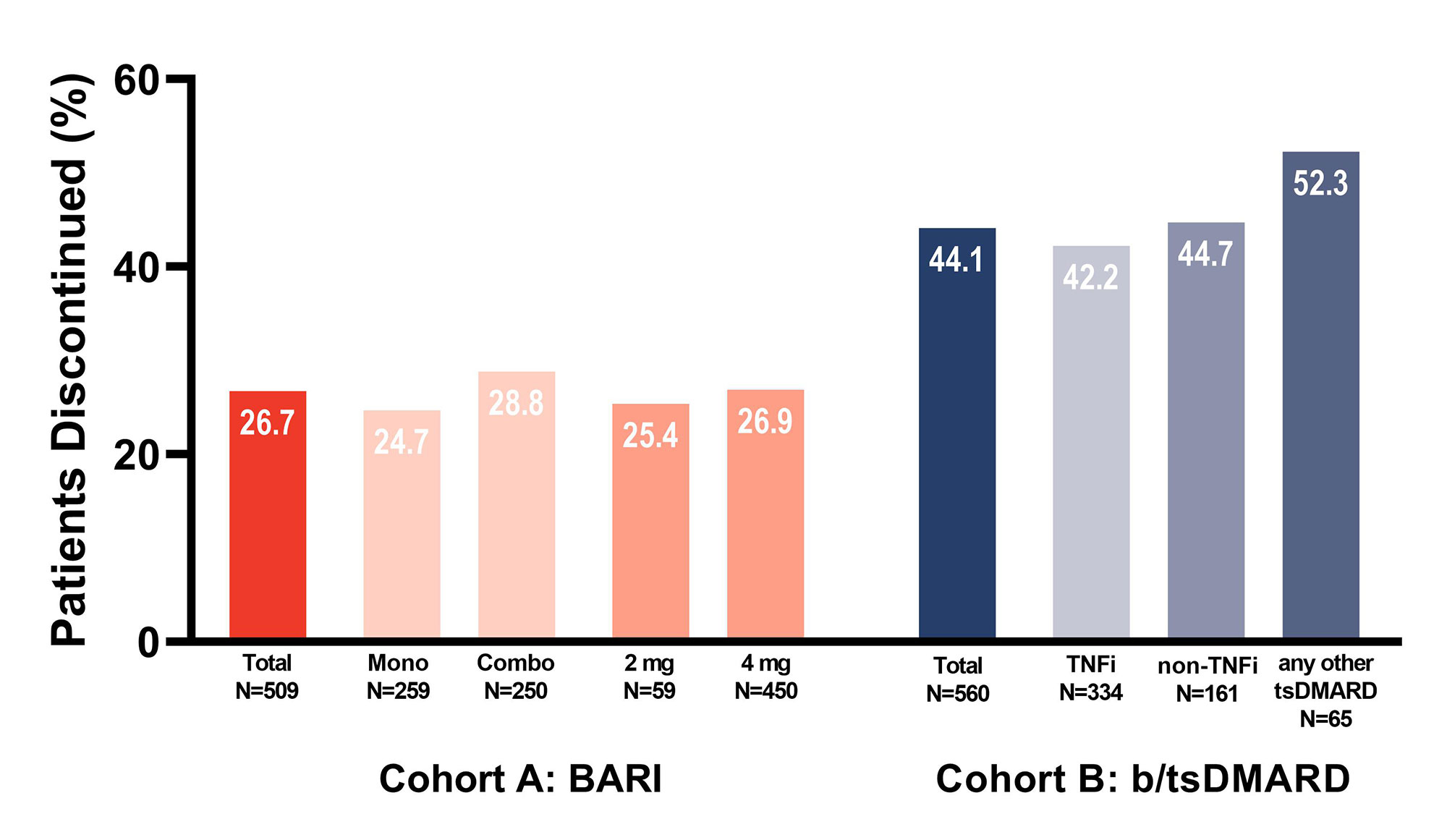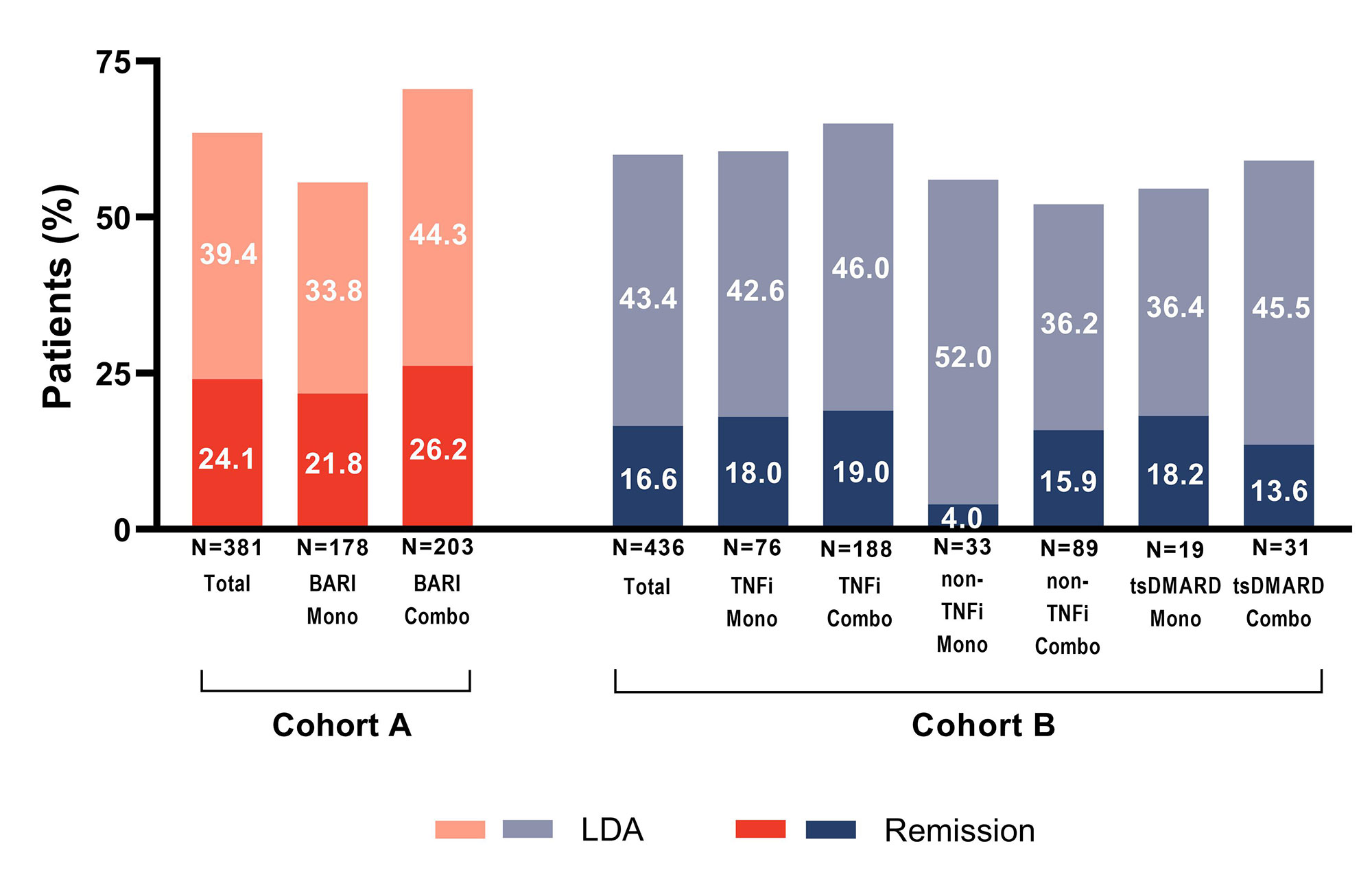Session Information
Date: Sunday, November 13, 2022
Title: RA – Treatment Poster III
Session Type: Poster Session C
Session Time: 1:00PM-3:00PM
Background/Purpose: RA-BE-REAL is a 3-year, multinational, prospective, observational study of adult patients with rheumatoid arthritis (RA) evaluating time to discontinuation of initial RA treatment. Baricitinib (BARI), an oral selective JAK1/2 inhibitor, is approved for the treatment of adults with moderate to severe active RA. This analysis reports time to discontinuation and effectiveness in patients with RA enrolled in Europe following 12M of either BARI, a biologic (b)DMARD or any other targeted synthetic (ts)DMARD, after starting that treatment for the first time.
Methods: Two cohorts were assessed: patients in cohort A initiated treatment with BARI (2-mg or 4-mg as monotherapy or in combination with any csDMARD) while patients in cohort B initiated any bDMARD (tumour necrosis factor inhibitors [TNFi] or non-TNFi bDMARD) or any other tsDMARD for the first time. Treatment initiation and changes were at the discretion of the patient or physician. Time to discontinuation for patients in cohort A (including patients using monotherapy or combination therapy with BARI 2-mg or 4-mg), and cohort B (bDMARD, and any other tsDMARD), was analysed in both bDMARD naïve and experienced patients. Response rates for remission and low disease activity (LDA) were determined using the Clinical Disease Activity Index at 12M. Steroid use was collected for both cohorts. This pre-specified interim analysis reports descriptive 12M data using summary statistics, without any inferential testing.
Results: At 12M, a similar percentage of patients discontinued 2-mg (25.4%) and 4-mg (26.9%) BARI whether as monotherapy (24.7%) or as combination therapy with any csDMARD (28.8%) (Fig 1). In cohort B, 42.2%, 44.7%, and 52.3% of patients using TNFi, non-TNFi, and any other tsDMARD, respectively, discontinued treatment at 12M (Fig 1). In both cohorts, patients naïve to b/tsDMARD were least likely to discontinue treatment while those who had more than two previous b/tsDMARD treatments were most likely to discontinue (Fig 2). The most common reasons for discontinuation were primary non-response (Cohort A: 6.3%; Cohort B: TNFi; 8.3%, non-TNFi; 10.6%, any other tsDMARD; 10.6%) and adverse events (Cohort A: 6.3%; Cohort B: TNFi; 5.1%, non-TNFi; 7.5%, any other tsDMARD; 13.6%). At 12M, remission rates were 21.8%, 18.0%, 4.0%, and 18.2% for those on monotherapy treatment with BARI, TNFi, non-TNFi, and any other tsDMARD, respectively. For combination therapy, remission rates were 26.2%, 19.0%, 15.9%, and 13.6% for BARI, TNFi, non-TNFi, and any other tsDMARD treated patients, respectively (Fig 3). At 12M, 31.8% and 36.0% of patients in cohort A and B, respectively, reported ongoing steroid use, a reduction of 25.9% and 18.0%, respectively, from baseline.
Conclusion: Despite an older and more bDMARD experienced population1, discontinuation rates were lower while remission was higher for those treated with BARI than those in cohort B. Discontinuation rate was consistent irrespective of BARI dose or if used in monotherapy or combination therapy. Discontinuation rates increased with number of previous b/tsDMARD in both cohorts, with numerically lower discontinuation rates at 12M for patients treated with BARI.
1. Alten, R. et al. Ann Rheum Dis 80, p. 1157 (2021)
To cite this abstract in AMA style:
Alten R, Burmester G, Matucci-Cerinic M, Ostor A, Zaremba-Pechmann L, Treuer T, Ng K, Gerwien J, Gibson K, Fautrel B. Time to Discontinuation and Effectiveness with Baricitinib in Rheumatoid Arthritis: 12-Month European Data from a Multinational, Prospective, Observational Study [abstract]. Arthritis Rheumatol. 2022; 74 (suppl 9). https://acrabstracts.org/abstract/time-to-discontinuation-and-effectiveness-with-baricitinib-in-rheumatoid-arthritis-12-month-european-data-from-a-multinational-prospective-observational-study/. Accessed .« Back to ACR Convergence 2022
ACR Meeting Abstracts - https://acrabstracts.org/abstract/time-to-discontinuation-and-effectiveness-with-baricitinib-in-rheumatoid-arthritis-12-month-european-data-from-a-multinational-prospective-observational-study/



